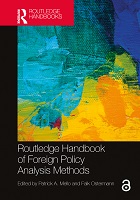Chapter 32 Discourse Network Analysis
Proposal review
| dc.contributor.author | Eder, Franz | |
| dc.date.accessioned | 2022-12-16T13:16:00Z | |
| dc.date.available | 2022-12-16T13:16:00Z | |
| dc.date.issued | 2023 | |
| dc.identifier.uri | https://library.oapen.org/handle/20.500.12657/60272 | |
| dc.description.abstract | This chapter introduces Discourse Network Analysis (DNA). DNA argues that actors are communicative agents that discursively seek to promote their policy preferences in a contested domestic political arena, by building coalitions of like-minded. Thus, DNA bridges the gap between Foreign Policy Analysis (FPA) and public policy by integrating domestic politics into the analysis of foreign policy decision-making. DNA rests on two methodological approaches. First, it uses qualitative content analysis for gathering and coding the statements of actors. Second, it utilizes social network analysis to link statements and actors in networks, and thus makes discursive strategies and processes of coalition-building visible. To illustrate the applicability of DNA to FPA, this chapter discusses the debates in the British House of Commons on the Iraq War of 2003. | en_US |
| dc.language | English | en_US |
| dc.subject.classification | thema EDItEUR::J Society and Social Sciences::JP Politics and government | en_US |
| dc.subject.other | political discourse, advocacy coalition framework, qualitative content analysis, social network analysis, domestic turn | en_US |
| dc.title | Chapter 32 Discourse Network Analysis | en_US |
| dc.type | chapter | |
| oapen.identifier.doi | 10.4324/9781003139850-39 | en_US |
| oapen.relation.isPublishedBy | 7b3c7b10-5b1e-40b3-860e-c6dd5197f0bb | en_US |
| oapen.relation.isPartOfBook | e8f67dd5-6ffa-46e0-8dcd-df3194c74ba0 | en_US |
| oapen.relation.isFundedBy | e739ee26-8689-4701-b745-93e324462fb0 | en_US |
| oapen.relation.isbn | 9780367689766 | en_US |
| oapen.relation.isbn | 9780367689803 | en_US |
| oapen.imprint | Routledge | en_US |
| oapen.pages | 21 | en_US |
| peerreview.anonymity | Single-anonymised | |
| peerreview.id | bc80075c-96cc-4740-a9f3-a234bc2598f1 | |
| peerreview.open.review | No | |
| peerreview.publish.responsibility | Publisher | |
| peerreview.review.stage | Pre-publication | |
| peerreview.review.type | Proposal | |
| peerreview.reviewer.type | Internal editor | |
| peerreview.reviewer.type | External peer reviewer | |
| peerreview.title | Proposal review | |
| oapen.review.comments | Taylor & Francis open access titles are reviewed as a minimum at proposal stage by at least two external peer reviewers and an internal editor (additional reviews may be sought and additional content reviewed as required). |

